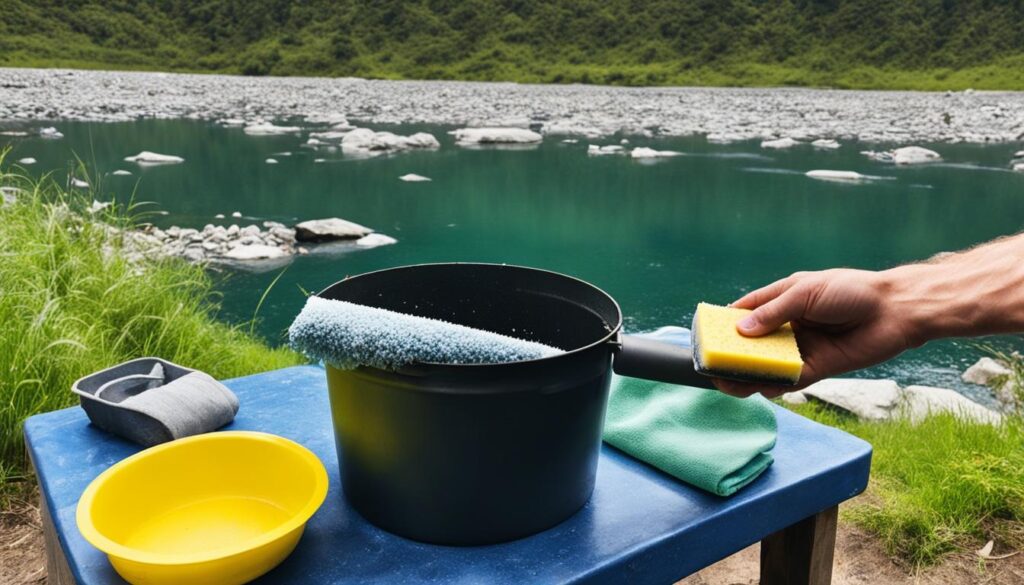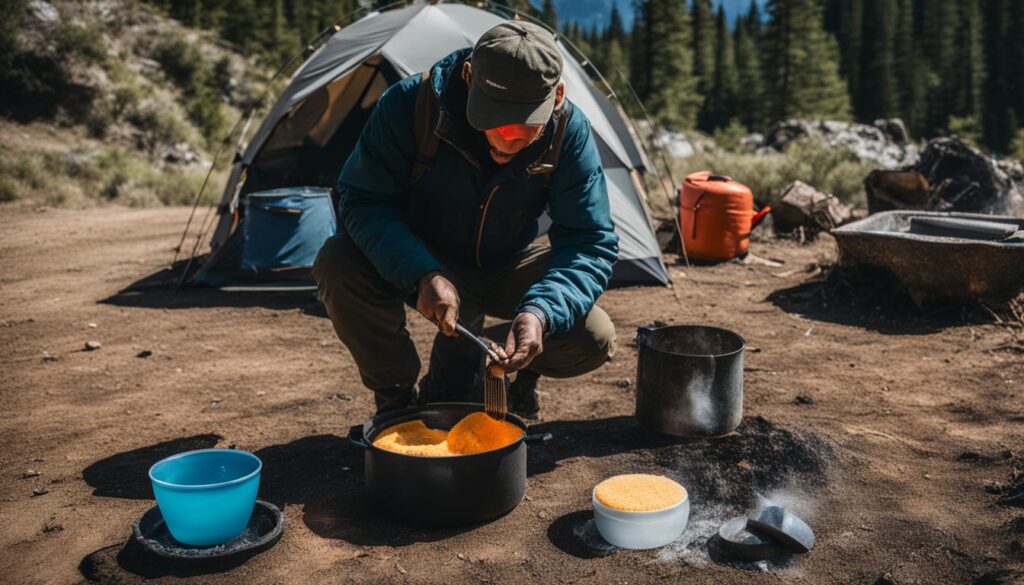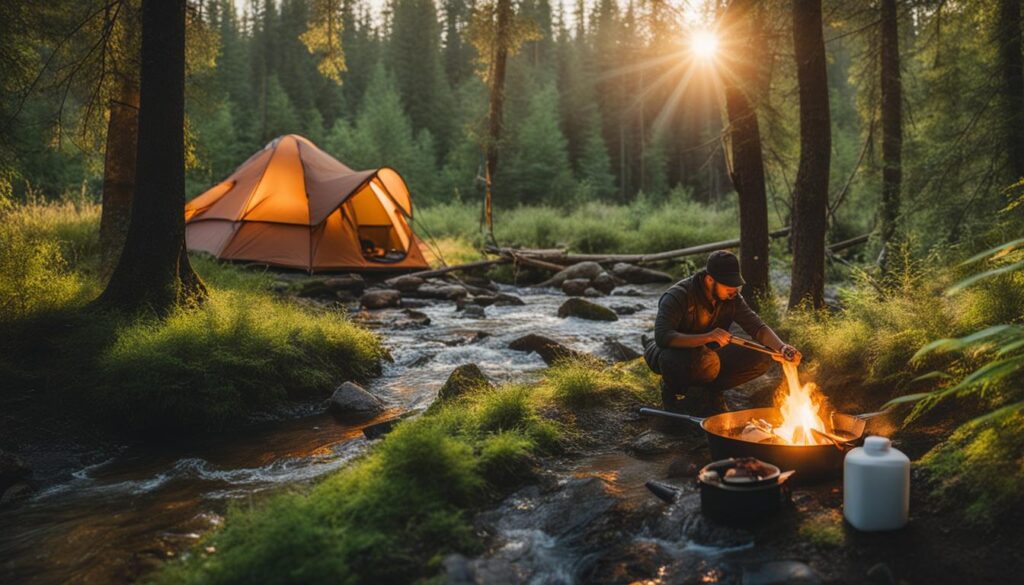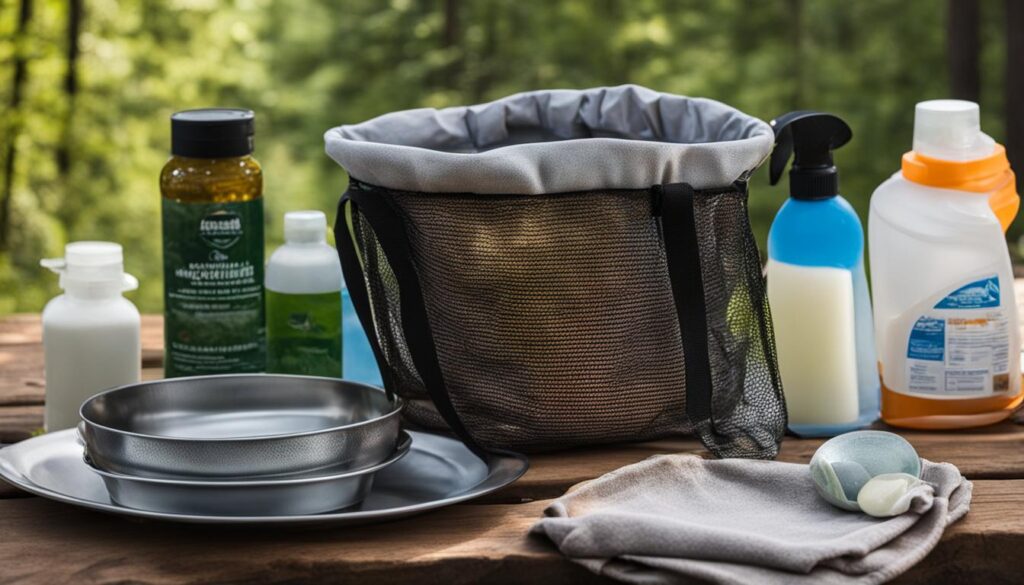Washing dishes while camping can be a challenge without the convenience of a dishwasher and limited water supply. However, with the right process and equipment, you can easily tackle this chore and minimize your impact on the environment. In this article, I will provide you with eco-friendly tips and step-by-step instructions on how to wash dishes while camping.
Key Takeaways:
- Washing dishes while camping requires proper planning and equipment.
- Utilize designated dishwashing facilities at campgrounds whenever available.
- Setting up a camping dishwashing station with essential equipment is crucial.
- Follow a step-by-step process for washing dishes while camping.
- Adopting eco-friendly practices benefits both the environment and your camping experience.
The Basics of Washing Dishes at a Campground
When camping at a developed campground with designated dishwashing facilities, it is recommended to use them. These facilities may include sinks and drain water basins, which make dishwashing more convenient. However, if these facilities are not available, you should be prepared to wash your dishes at your campsite. It is important to avoid washing dishes in bathroom sinks or at drinking water spigots, as these areas are not designed for food waste disposal and can attract animals. In this section, I will provide you with a detailed step-by-step process for washing dishes at your campsite using the appropriate equipment.
The Equipment You’ll Need
To effectively wash dishes at your campsite, you’ll need the following camping kitchen essentials:
- A collapsible camping sink or a plastic bin to serve as a sink
- A pan scraper to remove food residue from dishes
- A sponge or brush for cleaning
- Biodegradable soap to minimize environmental impact
- A fine-mesh strainer to remove solid food waste from dirty dishwater
- Clean dish towels or a drying rack for drying the dishes
Having these items readily available will ensure that you can easily wash and clean your dishes while camping.
Step-by-Step Process
Now that you have the necessary equipment, let’s walk through the step-by-step process of washing dishes at your campsite:
- Scrape off excess food from dishes using a pan scraper.
- Fill your collapsible camping sink or plastic bin with warm water.
- Add biodegradable soap to the water and mix well.
- Using a sponge or brush, wash each dish thoroughly, making sure to remove all food residue.
- Rinse the dishes with clean water, ensuring that no soap residue remains.
- If desired, sanitize the dishes by using a solution of water and vinegar or a mild bleach solution.
- Dry the dishes using clean dish towels or a drying rack.
By following this step-by-step process, you can ensure that your dishes are clean and ready to be used again. Remember to dispose of the dirty dishwater properly, following campground guidelines for greywater disposal.

Equipment Needed for a Camping Dishwashing Station
To set up a portable camping dishwashing station, you’ll need the following essential equipment:
- Collapsible camping sinks, plastic bins, or buckets to serve as sinks
- A pan scraper for removing food residue from dishes before washing
- A sponge or brush for cleaning
- Biodegradable soap to minimize environmental impact
- A fine-mesh strainer for removing solid food waste from dirty dishwater
- Clean dish towels or a drying rack for drying the dishes
Each of these items plays a crucial role in creating an efficient camping dishwashing station. Let’s delve into the importance of each:
- Collapsible camping sinks, plastic bins, or buckets: These versatile containers serve as makeshift sinks, allowing you to wash the dishes away from natural water sources like lakes or rivers. They are lightweight, easy to carry, and can be folded for convenient storage.
- Pan scraper: The pan scraper is a handy tool for removing stubborn food residues from dishes before washing. It helps prevent clogging the sink or drain with food scraps.
- Sponge or brush: A sponge or brush is essential for effectively cleaning dishes, utensils, and cookware. Choose a sponge or brush specifically designed for camping to ensure durability and ease of use even in outdoor conditions.
- Biodegradable soap: When washing dishes while camping, it’s crucial to prioritize the environment. Biodegradable soap ensures that harmful chemicals are not released into nature. Look for soap that is specifically labeled as biodegradable and eco-friendly.
- Fine-mesh strainer: A fine-mesh strainer helps separate solid food waste from the dirty dishwater, preventing clogs and making it easier to dispose of gray water responsibly. It ensures that food particles do not contaminate natural water sources.
- Clean dish towels or a drying rack: After washing and rinsing the dishes, proper drying is essential to avoid bacterial growth. Clean dish towels or a drying rack can be used to air dry the dishes, promoting hygiene and preventing moisture-related issues.
With these equipment essentials in place, you can create a convenient and eco-friendly camping dishwashing station that allows you to keep your cooking and eating utensils clean during your outdoor adventures.
Essential Equipment for a Camping Dishwashing Station
| Equipment | Description |
|---|---|
| Collapsible camping sinks, plastic bins, or buckets | Provides a portable and convenient sink for washing dishes |
| Pan scraper | Removes food residue from dishes before washing |
| Sponge or brush | Used for effective cleaning of dishes, utensils, and cookware |
| Biodegradable soap | Minimizes environmental impact while cleaning dishes |
| Fine-mesh strainer | Separates solid food waste from dirty dishwater for responsible disposal |
| Clean dish towels or a drying rack | Ensures proper drying of dishes to prevent bacterial growth |
Now that you know the essential equipment, let’s move on to the step-by-step guide for washing dishes while camping.
Step-by-Step Guide: How to Wash Dishes While Camping
Now that you have the necessary equipment, let’s walk through the step-by-step process of washing dishes while camping. This guide will help you clean your dishes effectively while minimizing water usage and environmental impact. The process includes steps such as cleaning off excess food, washing and rinsing the dishes using biodegradable soap, sanitizing (optional), and drying. We will also provide tips on how to search for more dirty dishes and consolidate and dispose of greywater properly. By following these steps, you will be able to complete the dishwashing task efficiently during your camping trip.
Gather all the dirty dishes
Before you start washing, make sure you have gathered all the dirty dishes in one place. This will help you keep track of what needs to be washed and avoid missing any items. Check the cooking area, dining area, and any other areas where dishes may have been used.
Scrape off excess food
Using a pan scraper or a utensil, scrape off any excess food from the dishes. This will make the washing process easier and prevent food waste from contaminating the dishwashing water.
Set up your dishwashing station
Find a flat and stable surface near a water source to set up your dishwashing station. Place your collapsible camping sink or plastic bin on the surface and fill it with warm water. Add a few drops of biodegradable dish soap to create a soapy solution for washing the dishes.
Wash the dishes
- Start by washing the least dirty items first, such as utensils or cups.
- Using a sponge or brush, scrub the dishes in the soapy water, making sure to clean both sides.
- Rinse the dishes thoroughly with clean water to remove any soap residue.
- For heavily soiled dishes, you may need to repeat the washing and rinsing process.
Sanitize (optional)
If you want to further sanitize your dishes, you can use a mild bleach solution or boiling water. Submerge the dishes in the sanitizing solution or pour boiling water over them and let them air dry.
Dry the dishes
After washing and sanitizing (if desired), let the dishes air dry in a clean dish towel or on a drying rack. Make sure the dishes are completely dry before storing them to prevent bacteria growth.
Consolidate and dispose of greywater
Pour the greywater (used dishwater) into a fine-mesh strainer or through a filter to remove any solid food waste. Dispose of the greywater at least 200 feet away from any water sources, following Leave No Trace principles. Do not pour it directly on the ground to avoid environmental contamination.
By following these step-by-step instructions, you can wash dishes in the great outdoors while camping. Keep in mind that minimizing water usage, using biodegradable soap, and practicing proper greywater disposal are key to maintaining an eco-friendly camping dishwashing routine.

Tips for Simplifying Dishwashing While Camping
Dishwashing while camping can be a hassle, but with a few simple hacks, you can make the process much easier. Here are some tips to simplify dishwashing while enjoying the great outdoors:
1. Finish Your Meals and Cook the Right Amount of Food
Encourage everyone to finish their meals and only prepare the necessary amount of food. By minimizing leftovers, you can reduce the number of dirty dishes that need to be washed.
2. Prep Dishes Before Washing
Prior to washing, scrape off excess food from plates and utensils. This step helps speed up the cleaning process and prevents food particles from clogging the sink or contaminating the water.
3. Use Hot Water and Biodegradable Soap
When washing your dishes, use hot water if available. Hot water helps to remove grease and grime more efficiently. Additionally, make sure to use biodegradable camping soap to minimize the environmental impact.
4. Properly Sanitize Dishes
Sanitizing your dishes is an important step to ensure they are thoroughly clean. You can use a mixture of water and a small amount of bleach or a commercial camping sanitizing solution. Follow the instructions provided to ensure safe and effective sanitization.
5. Allow Dishes to Dry Completely
Properly drying your dishes is essential to prevent the growth of bacteria. If possible, allow your dishes to air dry in a clean and hygienic area. Alternatively, use clean dish towels or a collapsible drying rack specifically designed for camping.
6. Check for Missed Dishes
Before packing up your dishwashing station, double-check for any missed dishes or utensils. It’s easy for small items to get overlooked, and it’s better to catch them before they become a hassle later.
By following these camping cleaning hacks and implementing these simple tips, you can simplify the dishwashing process while enjoying the beauty of nature. Your camping experience will be more enjoyable when you spend less time doing dishes and more time exploring the great outdoors.

Continue reading to discover more eco-friendly tips and benefits of an environmentally conscious approach to dishwashing while camping.
Benefits of an Eco-Friendly Approach to Dishwashing While Camping
Adopting an eco-friendly approach to dishwashing while camping not only helps protect the environment but also offers several benefits. By using biodegradable soap and properly disposing of greywater, you minimize the impact on natural water sources and wildlife. Additionally, washing dishes efficiently and conserving water allows you to extend your camping trip without running out of resources.
When you choose to practice eco-friendly dishwashing while camping, you contribute to the preservation of the surrounding ecosystem. By using biodegradable soap, you ensure that harmful chemicals do not contaminate the soil or water bodies, safeguarding the health of plants, animals, and aquatic life.
Properly disposing of greywater is equally important. Instead of letting it flow into open areas, it’s vital to follow Leave No Trace principles and dispose of it at least 200 feet away from water sources. This not only helps maintain the cleanliness of natural water bodies but also prevents the spread of diseases and protects the delicate balance of the ecosystem.
Moreover, adopting an eco-friendly approach to dishwashing enables you to make the most of limited resources while camping. By washing dishes efficiently, using minimal water, and avoiding wastage, you can extend your water supply and stay at your campsite longer without the need for frequent refills. This means more time to enjoy the great outdoors and less time spent on mundane chores.
Choosing an eco-friendly dishwashing routine while camping not only benefits the environment but also ensures a more sustainable and enjoyable camping experience.
Summary of Benefits:
- Protects the environment and wildlife
- Preserves the health of plants and aquatic life
- Conserves water resources for extended camping trips
- Maintains cleanliness and hygiene at the campsite
- Aligns with Leave No Trace principles
By incorporating eco-friendly practices into your camping dishwashing routine, you can minimize your environmental impact, conserve resources, and contribute to the preservation of nature’s beauty.

Using Reusable Dishes for Camping
One way to be more eco-friendly while camping is by using reusable dishes instead of disposable ones. Investing in durable enamelware or other reusable options can reduce waste and save money in the long run. Using reusable dishes not only contributes to a more sustainable camping experience but also ensures that you have reliable and durable dishware for future trips.
When choosing camping dishware, look for options that are lightweight, compact, and easy to clean. Enamelware, made from porcelain-coated steel, is a popular choice due to its durability and classic camping aesthetic. Stainless steel and BPA-free plastic dishware are also durable options that can withstand the rigors of outdoor use. Consider the size and shape of the dishes to ensure they fit well in your camping kitchen setup.
Using reusable dishes offers several advantages:
- Environmental impact: By using reusable dishes, you can significantly reduce the amount of waste generated during your camping trips. Disposable plates and utensils contribute to landfills and pollution, while reusable dishware helps conserve resources and protect the environment.
- Cost-saving: Although reusable dishes may require a higher upfront investment compared to disposable options, they can save you money in the long run. Instead of repeatedly purchasing single-use items, investing in high-quality reusable dishware allows you to use them for multiple camping trips without the need for replacement.
- Durability: Reusable dishes are designed to be durable and withstand the demands of outdoor use. They are resistant to breakage, making them ideal for camping activities. Unlike disposable options, reusable dishes can be relied upon for years to come.
- Versatility: Many reusable dishware options are designed to be versatile, allowing you to use them for various meals and cooking methods. From enjoying a warm cup of coffee in the morning to preparing a delicious meal over the campfire, reusable dishes can adapt to different camping scenarios.
By opting for reusable dishes, you can enjoy the convenience of eating and drinking without harming the environment. Not only will you reduce waste, but you will also have reliable and durable dishware that enhances your camping experience.

Continue reading to discover useful tips for simplifying dishwashing while camping in Section 8: Conclusion.
Conclusion
Washing dishes while camping may not be the most enjoyable task, but with the right approach and equipment, it can be simplified and eco-friendly. By following the camping dishwashing tips and step-by-step guide provided in this article, you can effectively wash dishes while minimizing your impact on the environment.
One of the key aspects of eco-friendly dishwashing while camping is using biodegradable soap. This allows you to maintain cleanliness without polluting natural water sources. Additionally, it is essential to dispose of greywater properly, ensuring that it doesn’t harm the environment or attract wildlife.
Another way to make your camping trips more sustainable is by considering the use of reusable dishes. Investing in durable enamelware or other reusable options helps reduce waste and saves money in the long run. By incorporating these practices into your camping routine, you can enjoy nature while maintaining a clean and eco-friendly camp kitchen.
Remember, every small action counts when it comes to preserving our environment. By adopting these eco-friendly dishwashing methods and implementing camping dishwashing tips, you contribute to the protection of our natural resources and create a more sustainable camping experience for generations to come.
FAQ
What is the best way to wash dishes while camping?
The best way to wash dishes while camping is to set up a camping dishwashing station with the necessary equipment, such as collapsible camping sinks, plastic bins, or buckets. Follow a step-by-step process that includes cleaning off excess food, washing and rinsing the dishes with biodegradable soap, sanitizing (optional), and drying. Dispose of greywater properly to minimize environmental impact.
Can I use regular dish soap while camping?
It is recommended to use biodegradable soap while camping to minimize the impact on the environment. Regular dish soap may contain chemicals that can harm natural water sources and wildlife. Biodegradable soap is designed to break down naturally and is a more eco-friendly option.
How can I conserve water while washing dishes while camping?
To conserve water while washing dishes while camping, follow these tips: scrape off excess food before washing, use a small amount of water for pre-rinsing, opt for a fine-mesh strainer to remove solid food waste from dirty dishwater, and re-use dishwater for multiple dishes. Consider using biodegradable soap that requires less water for rinsing.
What should I do with the dirty dishwater while camping?
Properly dispose of dirty dishwater, also known as greywater, to minimize environmental impact. Follow these guidelines: strain out solid food waste using a fine-mesh strainer, scatter the water at least 200 feet away from water sources and campsites, or dispose of it in designated greywater disposal areas if available.
Can I wash dishes in lakes or rivers while camping?
No, it is not recommended to wash dishes in lakes or rivers while camping. Water sources should be kept clean and free from contaminants. Use a camping dishwashing station or designated facilities for dishwashing.
Are there any eco-friendly alternatives to disposable dishes for camping?
Yes, using reusable dishes instead of disposable ones is a more eco-friendly option for camping. Invest in durable enamelware or other reusable options to reduce waste and save money in the long run. These can be easily cleaned and used for multiple camping trips.
How do I dry dishes while camping?
To dry dishes while camping, you can use clean dish towels or a drying rack. If you’re short on space, you can also air dry dishes by placing them upside down on a clean surface or hanging them from a clothesline.
Is it necessary to sanitize dishes while camping?
Sanitizing dishes while camping is optional but recommended, especially if you are camping in areas with limited access to clean water. Boiling water for a few minutes can effectively sanitize dishes. Alternatively, you can use sanitizing tablets or wipes specifically designed for camping.
How can I make the dishwashing process easier while camping?
To make the dishwashing process easier while camping, encourage everyone to finish their meals and cook only the right amount of food to reduce the number of dirty dishes. Prepping dishes by removing excess food before washing can also help simplify the process. Use hot water and biodegradable soap for thorough cleaning and consider using a pan scraper to remove stuck-on food residue.
Can I wash dishes in a bathroom sink while camping?
It is generally not recommended to wash dishes in a bathroom sink while camping. Bathroom sinks are designed for personal hygiene purposes and may not be equipped to handle food waste or provide proper drainage. Washing dishes in a designated campground dishwashing area or at your campsite’s prepared camping dishwashing station is a better option.

